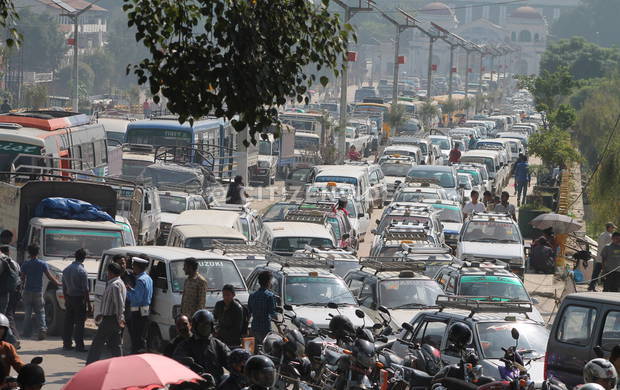
A missionary friend here in Tansen has a great answer to any child misbehaviour – “They’re in transition”. It’s not your fault when the kids are terrible – they are in transition from their last holiday, or into the school term, or because there is a new child in the class or whatever.
Life over here in Nepal is a bit like that, too. I struggle to decide what makes Nepal different to Australia – why is this beautiful country with lots of resources but poor infrastructure different to home. But at the moment, we’re starting to get a picture. Being “third world” basically means that your country is continually buffeted by external forces, and is unable to right itself quickly. Maybe at home people would expect politicians to change things, or lobby for better decisions. But in Nepal, the majority of the population is poor and have limited ability to lobby or create political pressure, particularly international political pressure.
We arrived in Nepal about nine months ago. Initially, we were in the midst of the tourist season, so the weather was warm and everything was working relatively smoothly. On April 25th we had a major earthquake, which was repeated a few weeks later. This obviously had a huge impact on Nepal’s infrastructure and economy. Many lives were lost and buildings destroyed, but we also had an influx of aid and people from outside. Since then, Nepal has been worrying as a nation about when the tourists would return, and the ongoing income they provide.
In that (transition) time, the constitution was finally signed. This is a more stressful event in Nepal than it would be in Australia. Political parties here lobby by enforcing strikes on various districts to create fear. If you are caught breaking the strike, you are at risk of having your vehicle or business set on fire, even if you are still in it. In strike times, no one can trade during daylight hours, so after five, the country lights up with vehicles and trade, as people hurry to arrange their daily tasks. Over those few months, there were some riots and many people were killed. Not a peaceful time. More transition.
Finally the constitution was signed and the process of electing and appointing officials started. As a country, there was a huge celebration as the chance of some stability appeared. The constitution is not perfect, so there promised to be some ongoing bickering, but the strikes seemed to stop immediately. After a disappointing monsoon (poor rainfall) and ongoing rebuilding from the earthquake, it did seem that something was in Nepal’s favour.
However, the hammer was about to fall. Some small extremist political groups began blockading the Indian border with Nepal, in protest over geographic state boundaries set up in the constitution. It became clear over time that the involved parties were a front for the Indian government. The border is not entirely closed. India has managed to select the items that will most restrict and torture Nepal, particularly coming into winter. Individuals can cross the border. However, petrol and diesel tankers are mostly prevented, and many imported goods are being held. Cooking gas is also restricted. At the moment, it has become clear that many international imports are also being blocked.
Nepal is a tiny, poor nation, sandwiched between two giants. The closest sea port for imports is in India and all imports need to cross that border. There is only one road across the border to China, which was damaged in the earthquake, so can only carry small trucks and tankers. Suddenly, we are trapped again. Travel is restricted, generators can’t run, buses are overloaded, with passengers on the roof, and people are cooking by open fire again. Medicines at the hospital are understocked and in some cases we are have reverted to very old fashioned technology. We’re not quite at the point of using ether for anaesthetics, luckily. Patients who need transfer to tertiary centres are less able to travel, as bus fares double and triple in cost. As time progresses, things are going to get more difficult and more people will be injured and die.
When I first arrived, I couldn’t get my head around the fact that Nepal is so poor, and Australia is so rich. But it’s more complicated than I understood. When your country is poor, it is prone to bullies, both internally and externally. You can be buffeted from one issue to the next, and there is no reserve to give aid and recover. A natural disaster can destroy a country without social services, and a bad monsoon can increase poverty simply by reducing the amount of rice each family has to store for the year. And when a big next door neighbour decides to bully you, and break international law (by restricting access to the sea) all you can do is jump up and down on your side of the fence and poke your tongue out at them.
So the country stays poor or gets poorer as a whole. Everyone is frustrated. Meanwhile, the truly poor tighten their belts a little more, stop buying extra food for their children, and revert to wood fires. When their children or family members get sick or injured, or burned, they think a lot more carefully about whether they can travel to hospital for the western medicine. More people get sick, more people die. And the poor get poorer.
Leave a Reply